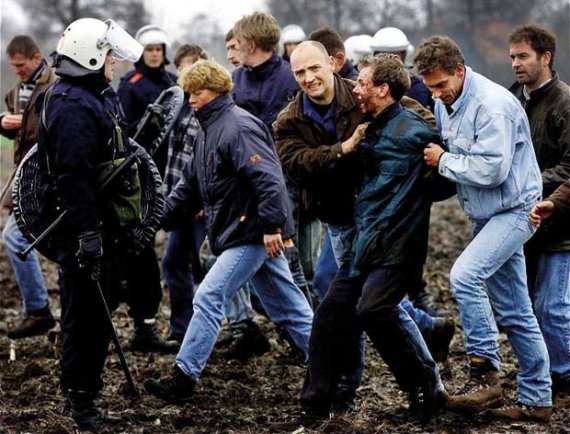In 2001, 260,000 animals had to beculled in the Netherlands to curban outbreak of foot and mouth disease among cows, pigs, goatsand sheep. However, emotions ranhigh at the sight of the massslaughter of healthy animals, which is why the governmentdecided in 2007 to change its approach. From now on theywould use emergency vaccinations to stop an infection spreadingrather than culling. The Central Veterinary Institute (CVI) wascommissioned by the ministry to calculate the effects of culling andvaccinations. One of the researchers was Jantien Backer.
What works best? ‘Our study shows that if you vaccinate all livestock in a radius of two kilometres around an infected farm, that works just as well as culls of farms in a radius of one kilometre. That’s just the surrounding farms. You still have to cull the animals on the farms where an infection has been found in both cases.’ Denmark has opted for culling, and this year Danish researchers reported that culling is better than emergency vaccination. How is that possible? ‘We have seen the Danish study. The livestock farms in Denmark are much more spread out than in the highly concentrated Dutch areas. That means a virus spreads more slowly while culling costs less and involves fewer animals. Also, emergency vaccinations are always bad for export. With culling, the EU rules say you can export animals and meat three months after the last infection, but with emergency vaccinations it’s six months. Denmark exports far more animals and meat to non-EU countries than the Netherlands. That makes emergency vaccinations more expensive.’ How do the sums work out for the Netherlands? ‘The economics as estimated by LEI for the Dutch situation show that the total costs of vaccination are just as high as for culling. If you vaccinate you have a lower sales price for the products of vaccinated animals but you have more meat because the animals are destroyed when you cull. In addition, there is less risk of the situation getting out of hand with vaccination.’ How likely is another foot and mouth outbreak? ‘The EU has eradicated foot and mouth. The foot and mouth outbreak in England in 2007 was caused by a virus in a lab. But foot and mouth is still endemic in other parts of the world; in Turkey, for instance, they are still vaccinating on a large scale with the aim of eventually eradicating foot and mouth. If that strategy works, you can stop vaccinating and only use vaccinations in emergency situations, as the Netherlands does.’

